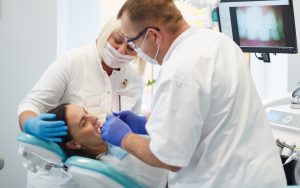Cancer is a frightening disease that has affected the lives of millions of people. About 1.5 million new cases are diagnosed in the United States, each and every year.[1]
Special Needs Dentistry
Interested in more Special Needs
Dentistry posts from the Center for
Dental Anesthesia? Click here.
Cancer annually claims hundreds of thousands of lives, although it isn’t always fatal. As frightening as it is, there is encouraging news on the cancer front, which we will address later in this article.
The most common treatments for cancer are surgery, radiation therapy, and chemotherapy. Radiation and chemo can have a big impact on a patient’s oral health. More than one-third of all cancer patients, in fact, experience complications affecting their mouths. Conversely, untreated oral disease can affect cancer treatment. It isn’t always possible, but it is recommended that people who are diagnosed with cancer receive a thorough oral evaluation before their treatment begins.[2]
As common and predictable as cancer treatment side effects are, patients are sometimes unable to receive standard dental care. Treating medically complex cases like cancer is a central part of our mission at the Center for Dental Anesthesia in Alexandria.[3]
Cancer Treatment and Oral Health
Cancer is defined by the Cancer Treatment Centers of America as “the uncontrolled growth of abnormal cells in the body.” In women, the most common form is breast cancer, and in men it is prostate cancer. Lung and colorectal cancer strike men and women in high, roughly equal numbers. But cancer can occur in any part of the body.[4]
The type of treatment a cancer patient receives depends on the type of cancer they have, and how advanced it is. It is common for patients to receive several types of treatment.[5]
 The impact of cancer treatment on oral health varies, depending on the type of treatment. Radiation and chemotherapy, however, often have the same side effects:
The impact of cancer treatment on oral health varies, depending on the type of treatment. Radiation and chemotherapy, however, often have the same side effects:
- Oral mucositis. Inflamed and painful mucus membranes, with the risk of infection.
- Xerostomia (dry mouth). Reduced flow of saliva, making eating and speaking difficult. May result from medication other than chemotherapy.
- Poor nutrition. Poor nutrition may result from dry mouth and associated difficulty eating.
- Poor dental development. Irregular growth of teeth and facial structure, especially in children under the age of nine.[6]
Some side effects are specific to chemo and radiation.
Chemotherapy
- Painful mouth and gums.
- Burning or swelling of the tongue.[7]
Radiation
- Cavities
- Reduced elasticity in the muscles used in chewing
See the Dentist First
Ideally, patients will have a thorough dental evaluation before beginning cancer treatment. A pre-treatment evaluation can help to minimize the complications brought on by cancer therapy. The dentist must be fully “in the loop” about the patient’s condition.[8]
Seeing a dentist before starting cancer treatment allows for:
- Treatment of any existing cavities or other issues
- Reduced mouth pain
- Better nutrition during treatment
- Preserved dental health
- Increased chances the patient successfully completes cancer treatment[9]
Patients who have already begun cancer treatment but have not seen the dentist should do so right away.
Something Positive
Patients with compromised
medical functions may be unable
to complete standard dental care
on their own … Our patients deserve
compassionate care tailored to
their distinct needs. – CDA
There are no two ways about it: hearing a cancer diagnosis is terrifying. But without sugar-coating reality, ongoing cancer research is bearing fruit, and there is some good news to report. The most significant may be that the death rate from cancer has dropped in recent years.[10]
The organizers of World Cancer Day 2020, held this past February 4, identified several reasons to remain positive about cancer, including:
- Artificial Intelligence is improving detection and treatment
- New therapy is showing great promise
- A new blood test is improving prostate cancer detection
You can find the details by following this link.
The Center for Dental Anesthesia
At the Center for Dental Anesthesia in Alexandria, treating medically complex cases, including people who have been diagnosed with cancer, is one of the centerpieces of our practice. Dr. Zeyad Mady and Dr. James Geren are committed to outstanding patient care, and bring comprehensive backgrounds and training to their work.
CDA is also committed to special needs dentistry, including physical and mental disabilities and dental phobia. Our doors are also open to the general public.
At the Center for Dental Anesthesia in Alexandria, we are committed to providing quality dental care. Please call our office to schedule an appointment.
____
Notes
[1] “Cancer Facts & Figures 2019,” a document published by the American Cancer Society. Referred to hereafter as Facts.
[2] Most common treatments: “Dental Team. Oral Complications of Cancer Treatment: What the Dental Team Can Do,” pp. 1-2. Referred to hereafter as “Oral Complications.”
https://www.nidcr.nih.gov/sites/default/files/2017-09/oral-complications-cancer-dental-team.pdf.
More than a third of patients have oral complications: “Cancer and Dental Health,” at:
https://www.mouthhealthy.org/en/az-topics/c/cancer-dental-health.
[3] Oral Complications.
[4] Quote, and cited facts: “What Is Cancer?” Cancer Treatment Centers of America website:
https://www.cancercenter.com/what-is-cancer.
[5] Treatment types:
https://www.cancer.gov/about-cancer/treatment/types.
[6] Oral Complications, pp. 1-2.
[7] Oral Complications, pp. 1-2, and “Chemotherapy and Your Mouth,” p. 3. Referred to hereafter as Chemo.
https://www.nidcr.nih.gov/sites/default/files/2017-09/chemotherapy-and-your-mouth.pdf
[8] Oral Complications, p. 2.
[9] Oral Complications, p. 2; Chemo, pp. 4-5; and “Mouth Care for Cancer Patients” at:
https://www.dana-farber.org/health-library/articles/mouth-care-for-cancer-patients/
[10] Declining death rates: “Behind the recent good news in cancer statistics,” at:
https://www.kevinmd.com/blog/2019/01/behind-the-recent-good-news-in-cancer-statistics.html
____
Contact Center for Dental Anesthesia:
703-379-6400
Location (Tap to open in Google Maps):
5284 Dawes Ave
Alexandria, Virginia
22311
